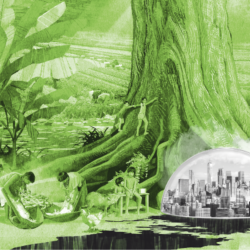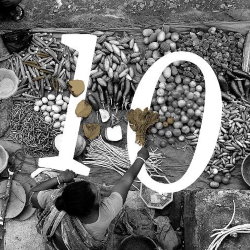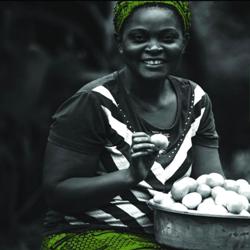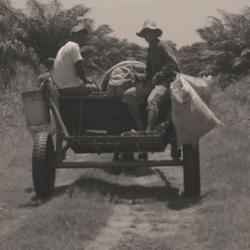Der Right to Food and Nutrition Watch ist ein Jahresheft, das seit 2008 von FIAN International zusammen mit Brot für die Welt und ICCO Cooperation herausgegeben wird; dem Watch Consortium gehören zahlreiche weitere Organisationen an.
Der Watch verfolgt die für das Recht auf Nahrung entscheidenden Politikbereiche, Prozesse und Themen auf globaler, kontinentaler, nationaler und lokaler Ebene. Damit macht er Einsatz, Kämpfe und Bestrebungen von Gemeinschaften vor Ort sichtbar. Als Monitoring-Instrument hat er zum Ziel, die Rechenschaftspflicht gegenüber dem Recht auf Nahrung und dessen Verwirklichung für alle zu fördern.
Die Ausgaben ab 2008 können kostenlos beim Regionalbüro Deutschschweiz bezogen werden.
 | 2021 | Not Our Menu: False solutions to hunger and malnutrition Food is our lifeline, yet we are largely disconnected from it. Instead, we are trapped in the illusion that we have the freedom to buy and consume products that we supposedly want and need, but know little about. This year’s edition tries to deepen our understanding of why producing more food under the for-profit industrial system isn’t a solution to hunger and malnutrition, but is in fact the one causing and worsening these problems. It stresses why we need to disconnect from the industrial food system and reconnect with other food systems that provide real hunger solutions, enabling us to feed ourselves with sufficient, nutritious, affordable, and culturally appropriate food. |
 | 2020 | Overcoming Ecological Crises: Reconnecting Food, Nature and Human Rights The production and availability of nutritious, healthy and culturally adequate food depends on functioning ecosystems, but also on our ability to recognize human rights and the intrinsic values of other living beings, from animals and plants to microorganisms. Yet the modern world, marked by capitalism and by patriarchy, treats humans and the rest of nature as two separate spheres. Our current economic and political system feeds on the exploitation of humans and nature to generate profits. This year’s Watch invites us to join the dots, and explore a new generation of human rights and environmental law that reimagines interrelatedness. |
 | 2019 | Women’s Power in Food Struggles In today’s context of rising hunger and ecological collapse, women and all those who seek to reimagine food, environment and economies, face ever-increasing attacks. This edition of the Right to Food and Nutrition Watch addresses key issues of power, and exposes the structural violence that degrades both women and the environment. The authors call out on food and feminist movements, which are as diverse as their struggles and political backgrounds, to build alliances and join the discussion to advance the rights of women, including young women and girls. |
 | 2018 | When Food Becomes Immaterial: Confronting the Digital Age Over the past few decades, public goods, such as water, education and health have increasingly been transformed into tradable commodities. Food has been traded for centuries, yet the recent failure in market regulation has led to its full commodification. As a result, it has contributed to the dispossession of productive resources. This affects peasant communities, damages the environment and changes our diets for the worse. Three intertwined dynamics – dematerialization, digitalization and financialization – are now altering the nature of both tradable goods and the markets where they are exchanged. |
 | 2017 | The World Food Crisis: The Way Out When the world food crisis exploded in 2007–2008, international prices of all major food commodities reached their highest level in nearly 30 years, pushing the number of people living in hunger to one billion. The ‘crisis’ brought the cracks of an unsustainable, broken food system into view, forcing policy makers to acknowledge its failures. A decade later, the root causes of the crisis persist. This 10th anniversary issue takes stock of the past decade and looks forward at the challenges and opportunities anticipated for the coming period. |
 | 2016 | Keeping Seeds in Peoples‘ Hands Peasant seed systems face severe threats due to the appropriation of nature by corporations and the accelerated destruction of agricultural biodiversity. Increasingly, seed and agrochemical businesses seek to privatize, monopolize and control seeds by patenting and commodifying this very source of life. Meanwhile, peasant and indigenous communities, who have been the developers and guardians of seeds for millennia, are finding their rights to save, use, exchange and sell seeds overshadowed by a corporate agenda that prioritizes profit over human rights and the sustainable maintenance of nature. |
 | 2015 | Peoples‘ Nutrition Is Not a Business Commonly referred to as ‘corporate capture’, the increasing control of businesses over food systems and resources, institutions, policy spaces and governance structures, is putting human rights at great risk. The world is witnessing this reality from the Americas to Asia, particularly since the 2008 world food crisis that shook societies across the globe. It is clear that the present economic model cannot guarantee the conditions for national governments to fulfill their human rights obligations, including the right to adequate food and nutrition. |
 | 2014 | Ten Years of the Right to Food Guidelines: Gains, Concerns and Struggles To mark the tenth anniversary of the Right to Food Guidelines, this year’s edition of the Watch turns the spotlight to this important instrument, reflecting on some of the major successes and obstacles in the path toward the realization of the right to adequate food and nutrition for all. The right to adequate food and nutrition is contending with the emergence of growing threats posed by corporate and economic interests that are increasingly gaining influence in policy spaces and taking control of food systems and natural resources. |
| (weitere Ausgaben folgen) | ||
